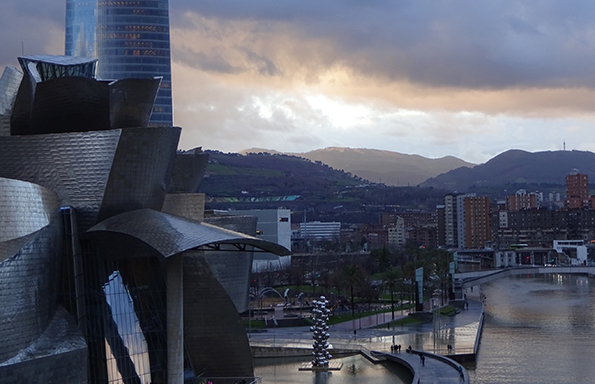Thomas Phillips is a PhD candidate in international human rights law, at University of Liverpool Law School
Like most typical Englishmen, I have spent many a sun-soaked week slowly roasting on Spanish beaches, but it had never occurred to me to leave the scorching south for the more emollient climate of the Basque Country until I was offered the chance to spend almost four months at the University of Deusto, Bilbao.
The chance was too good to miss, given my research interest in minority rights and the accommodation of different cultures and languages within the framework of the State. I have spent the past three years writing my PhD thesis on the parlous situation of the Kurds in Turkey, and the so-called “Basque Model” has been mooted as a possible starting-point for advancing their long-overdue freedom and equality. Spending some time here among scholars and experts seemed like a good way of learning more about Spain’s model of territorial autonomy.
Outside of the many hours spent poring over books in the library, I managed to free-up three days in order to rent a car and drive 700km from Bilbao to Pamplona via Guernica, Oñati, San Sebastian, and the Rioja Valley. The drive through the brobdingnagian Basque mountains evoked fond memories of a minibus ride I took through the beautiful Kurdish mountains in Southeast Turkey some two years earlier.
Oñati, a small town nestled between the mountains, was a particularly enlightening experience. There I found the International Institute for the Sociology of Law, housed in an ancient religious building containing a well curated library. In Oñati, the Basque language – a non-Indo-European language of unknown provenance – is spoken freely in the streets and at work. The Basque flag is flown alongside the Spanish national flag and the EU flag: a poignant reminder of the contribution made by the EU to the advancement of minority freedoms in Europe and elsewhere (for a while, even Turkey made limited concessions to its Kurds in pursuit of EU accession). Beyond the evident cultural and linguistic freedoms, I learned that all businesses in this town are worker-owned and worker-managed on the basis of one worker, one vote: part of the Spanish cooperative tradition of democratizing the important economic sphere of life that reached its apogee in the takeover of Barcelona by the Spanish anarchists in 1936.
From a scholarly perspective, I have profited from understanding the benefits and failures of the Spanish model of cultural accommodation. For all of its limitations, Basque people are at least free to govern themselves within particular limits and to manage their own identities. Unlike Turkey, Spain eventually focused on the grievances of its constituent peoples and made serious efforts to deal with them in a way that lasts, instead of focusing in monomaniacal fashion on violence and security. Aspects of the Spanish compromise are, I think, valuable models or starting-points for answering the Kurdish Question.
Later this month I will have an opportunity to discuss these ideas in a seminar with scholars and researchers in Bilbao, and to add their perspectives to those of my Kurdish and Turkish friends. In the near-term, my PhD supervisor and I are planning to organise a conference in Liverpool on the issue of self-determination and to host one of Deusto’s PhD candidates.
Overall, the experience has been, and continues to be, an interesting and enjoyable one, but at some point I will have to spend a few days baking on a Barcelona beach.
